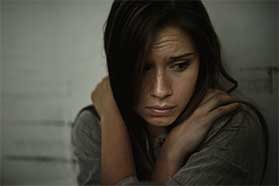Phobia Treatment in Bainbridge Island, WA

What are Phobias?
Phobic disorders—or phobias—are a type of anxiety condition that causes intense and disabling fear, anxiety and panic in reaction to something that poses little or no real danger. Although fear is the natural response to danger, people with phobias generally experience irrational or excessive feelings of fear that are difficult to control. Most people recognize that the fear they are feeling is extreme, but their reactions are unavoidable.
Collectively, phobic disorders have become the most common form of psychiatric illness, surpassing mood disorders and substance abuse. People can develop phobic reactions to almost anything, but the most common phobias include fear of animals, activities or social situations. Most phobias are developed in childhood, but they can develop in adulthood, too. The exact cause of phobias is not known, but most appear to be associated with a traumatic experience or a learned reaction.
Types of Phobias
Fear is perfectly normal and even helpful to experience in dangerous situations—it's there to protect us by activating the body's "fight-or-flight" response. When our bodies and minds are alert and ready for action, we are able to respond quickly to protect ourselves. However, when someone has a phobic reaction, the threat is greatly exaggerated or nonexistent, which often causes the affected individual to shut down.
Although phobias are very common, the resulting distress may not disrupt everyday life; therefore, it does not need to be addressed—the cause of the phobia is simply to be avoided. However, there are many phobic disorders that cannot be avoided and need to be addressed. In general, phobias are divided into three main categories:
- Specific phobia: Any kind of anxiety disorder that amounts to an unreasonable or irrational fear related to exposure to specific objects or situations (e.g., insects, germs, heights, etc.)
- Social phobia: An anxiety disorder characterized by overwhelming anxiety and excessive self-consciousness in everyday social situations such as work or shopping.
- Agoraphobia: This type of anxiety disorder causes the fear of being in (or anticipating) situations from which escape might be difficult (e.g., public events, the grocery store, a parking lot, etc.).
For people with phobias, they will do whatever it takes to avoid the uncomfortable and often terrifying feelings of phobic anxiety — it can disrupt daily routines, limit work efficiency, reduce self-esteem and place strain on relationships.
Symptoms and Treatment
There are hundreds of types of phobias, although not all require treatment because they do not affect daily life. Symptoms associated with a phobia typically manifest in both physical and emotional ways. These symptoms include:
- A feeling of overwhelming anxiety or panic
- Difficulty breathing
- Feeling an intense need to escape
- Increased heart rate
- Chest pain or tightness
- Trembling or shaking
With proper treatment, the majority of phobia patients can completely overcome their fears and be symptom-free for life. Effective relief is usually gained through either cognitive behavioral therapy, medication or a combination of the two. Behavior therapy involves confronting the feared object or situation in a carefully planned, gradual way so the patient can learn to control his or her mental and physical reactions of fear. Medications are used to control the feelings of panic or anxiety felt during a phobic situation.
Request more information about phobia treatment today. Call (206) 966-4522 or contact Dr. Marina Abrams online.
Water's Edge Natural Medicine
Address
1000 2nd AveSuite 2920
Seattle, WA 98104
(206) 966-4522
www.naturopathic.com
Hours
Mon:
9:00 am - 4:00 pm
Tue:
9:00 am - 4:00 pm
Wed:
8:00 am - 3:00 pm
Thu:
9:00 am - 4:00 pm
Fri:
8:00 am - 12:00 pm
Sat:
Closed
Sun:
Closed

